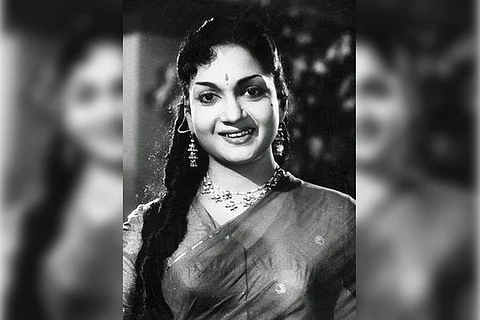

The recent election to the South Indian Film Artistes’ Association, popularly known as the Nadigar Sangam, was clouded with a lot of controversy from the beginning to the end with results that went unannounced. Amidst the hullabaloo, the history that got buried was that actor Anjali Devi, who had contributed greatly to the south Indian film industry for half a century with a phenomenal acting and production career, was the first woman president of the Sangam. Elected in 1959, she also designed the logo that the Sangam carries till date.
Anjali Devi sauntered through life and a male dominant film industry. From her dance career at a young age to diversifying into acting, producing and presiding over the Nadigar Sangam, she lived through a progressive path.
Anjali Devi was born as Anjanamma in August 1927 in the village of Peddapuram in the then Madras Presidency. She started her career at the tender age of 8 as a dance-drama artiste. At the age of 9, she made her film debut as a child artiste in the Telugu film Harischandra. Since then her career spanned between the Telugu and Tamil industries for a period of over 50 years. Throughout this period, Anjali Devi gave a number of hits that made her famous in every nook and corner of both the states.
The actor’s introduction to the city of Chennai was artistic and cause-oriented. At the age of 16, she performed at a dance show presided over by the then Madras Presidency Governor, Arthur Hope, to raise funds for World War II efforts. Her performance enthralled a lot of people, including Telugu director C Pullaiah. He introduced Anjanamma as Anjali Devi in his 1947 film Gollabhama. The film was also dubbed in Tamil and released. For as long as she lived, she embraced ‘Anjali Devi’ as her name and Chennai city as her home.
Anjali Devi in a still from Aadavantha Deivam
Anjali Devi continued acting in the Tamil film industry from 1947. Her first Tamil film was Mahathma Udhangar, which did not become a hit. But her second Tamil film released the same year, Adhithan Kanavu, opposite TR Mahalingam, was a massive hit. Her growth in the Tamil film industry was steady, 1950 to 1951 could even be called the ‘Year of Anjali Devi’. The list of movies goes on with various dubbed films like Swapna Sundari, Maayakaari, Maayamaalai, Sthree Sahasam and Nirabarathi. Posters of her films decorated the streets of Tamil Nadu throughout the year. The 1954 Tamil film Penn, in which she acted as Kanmani, touched upon the ideologies of Periyar’s self-respect movement, which propagated inter-caste marriages. Her career best is the evergreen Lava Kusa, which took 7 years to release. The film gave Telugu audiences their own ‘Seetha Devi’ manifested on the screens and minds, derived from the Ramayana epic.
Lava Kusa poster
Anjali Devi acted alongside all the leading actors of the day such as MGR, Sivaji Ganesan, SS Rajendran, Gemini Ganesan in Tamil, NT Rama Rao, Nageswara Rao in Telugu, and Rajkumar in Kannada, in over 350 films in her fascinating career. After ruling as a lead actor, by the film industries’ unforgiving feudal standard for roles according to age for women actors, she kept on acting in films by taking up characters such as sister, mother and so on.
In 1953, along with her husband Adinarayana Rao, she founded Anjali Pictures, which produced her first film Poongothai/Paradesi as a Tamil-Telugu bilingual release. It was actor Sivaji Ganesan’s first film but was released only after his celebrated Parasakthi. The production house introduced the latest techniques of that period, including ‘slow motion’, to the south film industry. Anjali Pictures produced 27 films in Tamil and Telugu during her period.
Anjali Devi and Gemini Ganesan in Illarame Nallaram
Anjali Devi bagged a number of awards and accolades, including 4 Filmfare awards for acting and the President’s Gold Medal for best actress for Lava Kusa.
The actor lived a calm and endearing personal life in Chennai. At 80, she rebelled over the existing conventions of widowhood. She broke the tradition of Sathabishekam, a Hindu ceremony in which a couple is married again on the husband’s completion of 80 years of life, irrespective of the wife’s age. After the passing away of her husband, Anjali Devi went ahead and celebrated the Sathabishekam on the completion of her 80th birthday, placing her husband’s photo beside her.
At this time, while it is still not possible to see another woman president of the South Indian Film Artistes’ Association, it is inspiring to remember the woman who impressively broke the rules decades ago. Anjali Devi’s phenomenal life story, buried in the past, stands tall as an inspiration.
(Translated from B Jeevasundari's Tamil original, published in Kungumam Thozhi magazine, by Kavitha Gajendran)
B Jeevasundari is an activist and senior journalist based in Chennai. Kavitha Gajendran is a Chennai-based activist who voices out on socio-political issues.